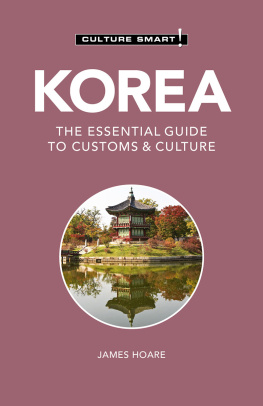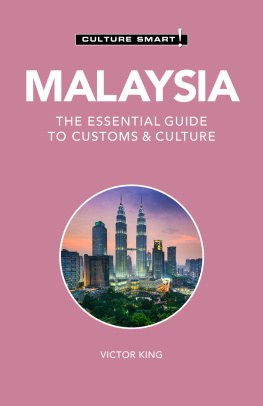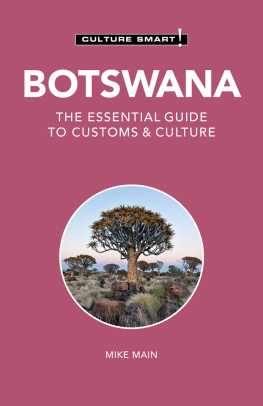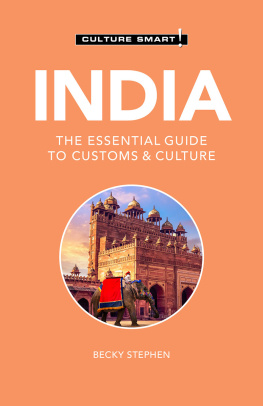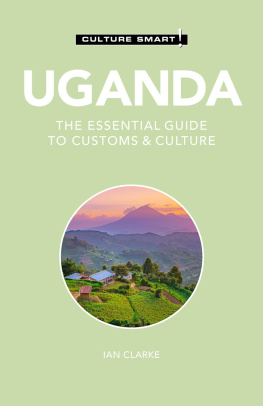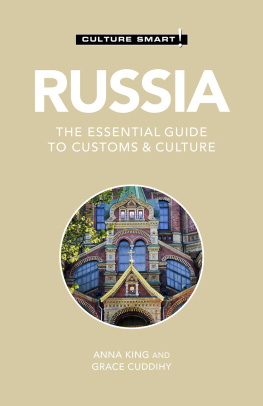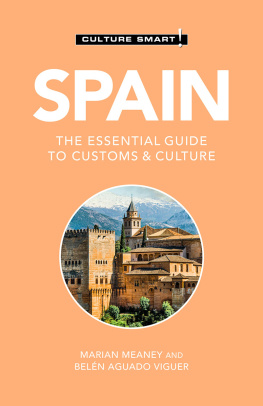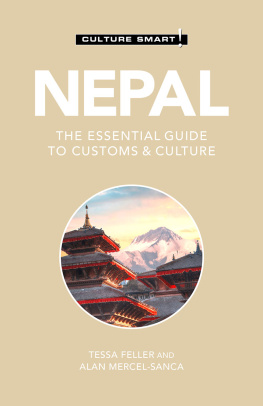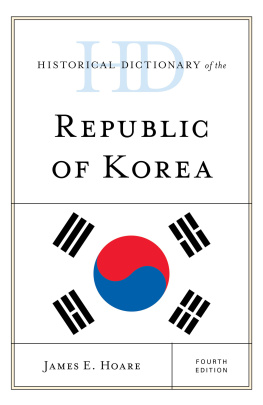James Hoare - Korea: The Essential Guide to Customs & Culture
Here you can read online James Hoare - Korea: The Essential Guide to Customs & Culture full text of the book (entire story) in english for free. Download pdf and epub, get meaning, cover and reviews about this ebook. year: 2021, publisher: Kuperard, genre: Art. Description of the work, (preface) as well as reviews are available. Best literature library LitArk.com created for fans of good reading and offers a wide selection of genres:
Romance novel
Science fiction
Adventure
Detective
Science
History
Home and family
Prose
Art
Politics
Computer
Non-fiction
Religion
Business
Children
Humor
Choose a favorite category and find really read worthwhile books. Enjoy immersion in the world of imagination, feel the emotions of the characters or learn something new for yourself, make an fascinating discovery.
- Book:Korea: The Essential Guide to Customs & Culture
- Author:
- Publisher:Kuperard
- Genre:
- Year:2021
- Rating:3 / 5
- Favourites:Add to favourites
- Your mark:
- 60
- 1
- 2
- 3
- 4
- 5
Korea: The Essential Guide to Customs & Culture: summary, description and annotation
We offer to read an annotation, description, summary or preface (depends on what the author of the book "Korea: The Essential Guide to Customs & Culture" wrote himself). If you haven't found the necessary information about the book — write in the comments, we will try to find it.
Korea: The Essential Guide to Customs & Culture — read online for free the complete book (whole text) full work
Below is the text of the book, divided by pages. System saving the place of the last page read, allows you to conveniently read the book "Korea: The Essential Guide to Customs & Culture" online for free, without having to search again every time where you left off. Put a bookmark, and you can go to the page where you finished reading at any time.
Font size:
Interval:
Bookmark:
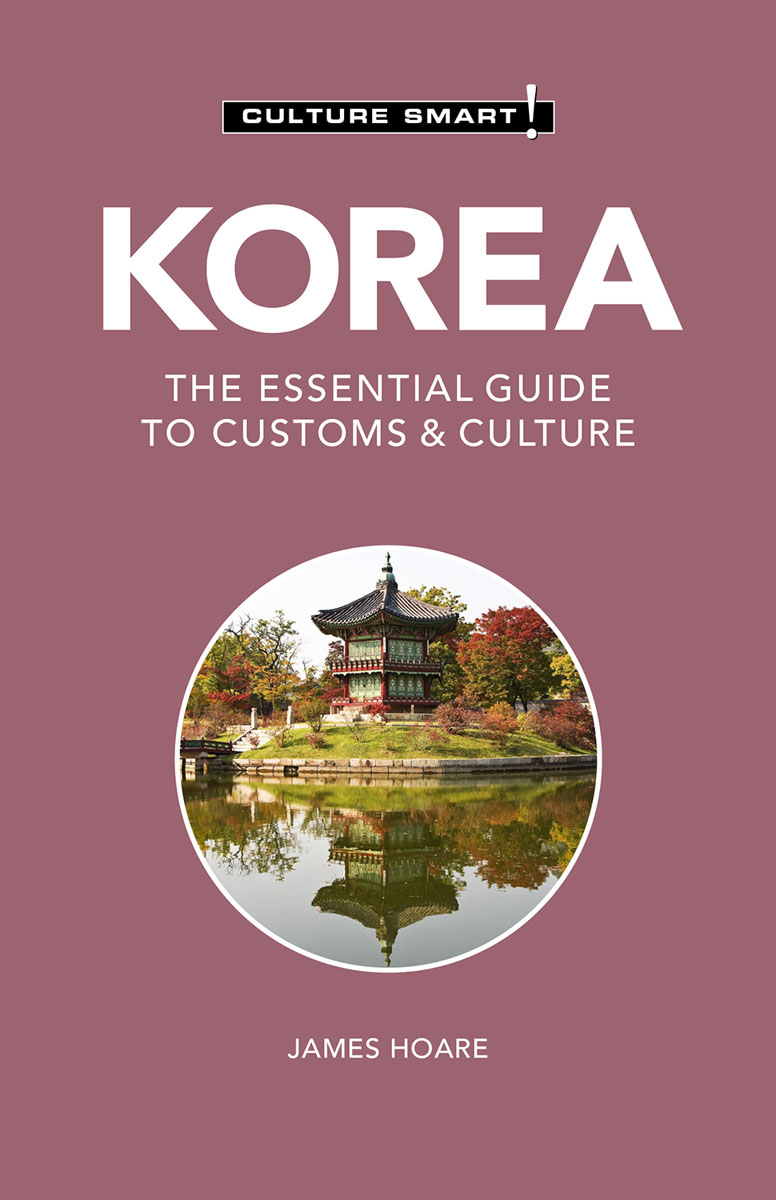
The real voyage of discovery consists not in seeking new landscapes, but in having new eyes.
Adapted from Marcel Proust, Remembrance of Things Past.
ISBN 978 1 78702 888 3
British Library Cataloguing in Publication Data
A CIP catalogue entry for this book is available from the British Library
First published in Great Britain
by Kuperard, an imprint of Bravo Ltd
59 Hutton Grove, London N12 8DS
Tel: +44 (0) 20 8446 2440
www.culturesmart.co.uk
Inquiries:
Design Bobby Birchall
Printed in Turkey
The Culture Smart! series is continuing to expand. All Culture Smart! guides are available as e-books, and many as audio books. For further information and latest titles visit www.culturesmart.co.uk
JAMES HOARE spent over thirty years in the British Diplomatic Service, which included postings to Seoul and Beijing. As Charg dAffaires, he established the British Embassy in Pyongyang, North Korea. He has a Ph.D. in East Asian history and has written extensively on China, Japan, and the two Koreas. His books include Embassies in the East: The Story of the British and their Embassies in China, Japan and Korea from 1859 to the Present; Historical Dictionary of the Republic of Korea; Historical Dictionary of the Democratic Peoples Republic of Korea; and with his wife, Susan Pares, Korea: An Introduction; Conflict in Korea: An Encyclopedia; and North Korea in the 21st Century: An Interpretative Guide.
Dr. Hoare is a regular guest on radio and television. He is an Associate Fellow at the Royal Institute of International Affairs (Chatham House), and an Honorary Research Associate, Centre of Korean Studies, School of Oriental and African Studies, University of London. He is a past president of the Royal Asiatic Society, Korea Branch, and of the British Association for Korean Studies.
COVID-19
The coronavirus pandemic of 2020 affected millions of people around the world, causing unprecedented social and economic disruption. As the impact of this global crisis continues to unfold, in many countries social norms are being challenged, and enduring changes will be reflected in future editions of Culture Smart! titles.

The twentieth century was not kind to the people of the Korean peninsula. In 1905 Japans defeat of Russia paved the way for the Japanese protectorate in Korea. Then in 1910, the Japanese annexed Korea as a full-scale colony. Liberation in 1945 brought not independence as all Koreans had hoped, but the division of the peninsula that has lasted until today. North Korea attempted to reunify Korea by force in 1950. Outside intervention saved both Korean states from extinction, but the war intensified the division.
Only after 1998 was there any significant and sustained move to heal the wounds of the past, and that only lasted ten years. Since 2018, there have been signs of a possible improvement in relations between the two Koreas but there is a long way to go. The issue is complicated by the very different conditions of the two Koreas. The North remains a dictatorship, and having once led in economic development and industrialization, is in economic decline. The South, by contrast, once viewed as an economic disaster ruled by authoritarians, built a modern economy in the 1960s and 1970s, weathered the financial storms of the 1990s, and seems well on the road to democracy. The two Koreas are now interacting as never before. Major issues remain, such as the role of outside powers and North Koreas pursuit of a nuclear weapons program. Yet the future again looks more positive than it has for years.
The 1988 Seoul Olympics and the 2002 World Cup, shared with Japan, helped to increase knowledge about South Korea, but have not overcome widespread ignorance about the Korean people and their culture. Yet those who visit Korea, whether North or South, will find a place of great interest with much to offer. Koreans, when not constrained by politics or other considerations, are friendly and sociable. The peninsula has areas of outstanding natural beauty. The Souths cities, if not always beautiful, are vibrant and alive. The North, while very different, is well worth getting to know.
Culture Smart! Korea shows how Koreans think and act, the pitfalls to avoid, and introduces some of the delights of the peninsula. It is the product of an involvement that stretches back to the early 1970s, and of my residence in both North and South Korea. It derives partly from a little book called Simple Guide to Korea: Customs and Etiquette, which my wife and I wrote. The European Department of the North Korean Ministry of Foreign Affairs, to whom we gave a copy, told us that this had been made required reading for all the staff of the department, since it provided real insights into Korean thinking and behavior. I hope that Culture Smart! Korea will do the same for many other readers.
Official Name | Republic of Korea | Daehan minguk |
Capital City | Seoul | Pop. 10.4 million |
Major Cities | Inchon, Taejon, Taegu, Pusan, Kwangju, Ulsan | |
Area | 38,131 sq. miles (98,759 sq. km) | |
Climate | Continental, tempered by maritime influences | |
Population | 51 million (2019) | |
Ethnic Makeup | Korean: 100% | |
Government | Democracy, with executive president and unicameral legislature (National Assembly) | |
Borders | Demilitarized Zone between North and South Korea: 151 miles (240 km) | |
Currency | Won, divided into 100 chon, but the latter has gone out of usage. The South Korean won has a different exchange value from the North. | Coins are Won 1, 5, 50, 100, and 500. The first two have practically disappeared. Notes are Won 1,000, 5,000, and 10,000. |
Language | Korean. People who attended school before August 1945 will have learned Japanese. | |
Religion | Traditional: Buddhism, shamanism, and Confucianism. Since the eighteenth century, Christianity has grown, and over a quarter of the population is now Christian. There are a number of new religions, and Islam has about 40,000 followers. | |
Media | Thriving press, radio, and TV. Widespread use of computers, the Internet, and cell phones. There are three English-language dailies: Korea Herald, Korea Times, and the Joongang Ilbo supplement to the International Herald Tribune. | |
Internet Domain | .kr | |
Electricity | 220 v, although some 110 v outlets may still be found. US-style plugs are the norm. |
Font size:
Interval:
Bookmark:
Similar books «Korea: The Essential Guide to Customs & Culture»
Look at similar books to Korea: The Essential Guide to Customs & Culture. We have selected literature similar in name and meaning in the hope of providing readers with more options to find new, interesting, not yet read works.
Discussion, reviews of the book Korea: The Essential Guide to Customs & Culture and just readers' own opinions. Leave your comments, write what you think about the work, its meaning or the main characters. Specify what exactly you liked and what you didn't like, and why you think so.

